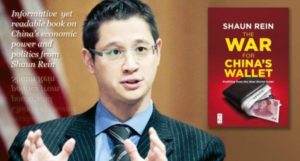
One of the key barriers in China’s massive outbound investment programs, like One Belt, One Road (OBOR) is the lack of management talents, tells author Shaun Rein of The War for China’s Wallet: Profiting from the New World Order on the Human Resources page at LinkedIn. “Private Chinese companies have the capital and will pay for consulting services, especially companies in the tech sector.”
Human Resources:
Rein: China wants to raise USD 1 trillion to invest in dozens of countries under the OBOR initiative in order to grow economically and cement power. What are the odds of success? I think it will succeed but it won’t be easy. Many companies Chinese companies simply don’t have enough management talent to operate across dozens of different countries led by diverse ethnic and religious groups. As companies grow regionally, they will need to recruit and retain the right country heads and regional leaders.Right now too much decision-making is in the hands of CEOs and founders.
Chinese companies, as well as corporations from nations like Pakistan and Malaysia that are part of OBOR, will need to rely on executive search firms to find the right talent quickly.
LZ: What sectors are Chinese state-owned enterprises and private Chinese companies investing in the most as they expand overseas? Are there specific regions or sectors they are targeted?
Rein: Private Chinese companies have the capital and will pay for consulting services, especially companies in the tech sector. They understand they need top talent as they expand, predominantly into Southeast Asia and Africa.
LZ: What are the underlying reasons behind the international expansion of Chinese companies? Are they political or economic? Do Chinese firms prefer to grow organically or through mergers and acquisitions?
Rein: Chinese companies typically look to grow abroad for three main reasons:
1. To gain access to technology quicker than developing it organically. We have also seen examples in the construction industry where Chinese companies grow via acquisition. Zoomlion acquired Dutch crane maker Raxtar to move into the high-end hoisting sector, for example.
2. To acquire western brands to bring back to China. Building a strong brand can take decades, so it is easier for Chinese companies to buy brands abroad. A Chinese company bought Australian condom maker Jissbon, for instance.
3. To diversify revenue streams. Although China still enjoys strong growth, it is not at the 10% clip of years past, so Chinese companies are looking to buy assets abroad to diversify revenue streams away from China. Businesses like Alibaba and Baidu, for example, have been investing aggressively in the US, for example.
LZ: Some criticism of China’s outbound strategy is that companies, especially SOEs, bring their own machinery and talent pool when they expand abroad and don’t source equipment and labor locally as much as local politicians expected. Do you see non-Chinese nationals being allowed into key management positions to bring strategic input to the business?
Rein: In some cases, China companies actively support promoting non-Chinese to senior executive positions.Take Geely automotive has injected capital and connections into Volvo but kept most of the leadership in charge of the famed Swedish automaker. In another example, Alibaba hired Michael Evans, formerly of Goldman Sachs, to be its president of international operations. Chinese firms acquire assets abroad to get brands, technology and management know-how.
More at the LinkedIn page of Human Resources.
Shaun Rein is a speaker at the China Speakers Bureau. Do you need him at your meeting or conference? Do get in touch or fill in our speakers’ request form.
Are you interested in more experts on China’s outbound investment? Do check out this page.



